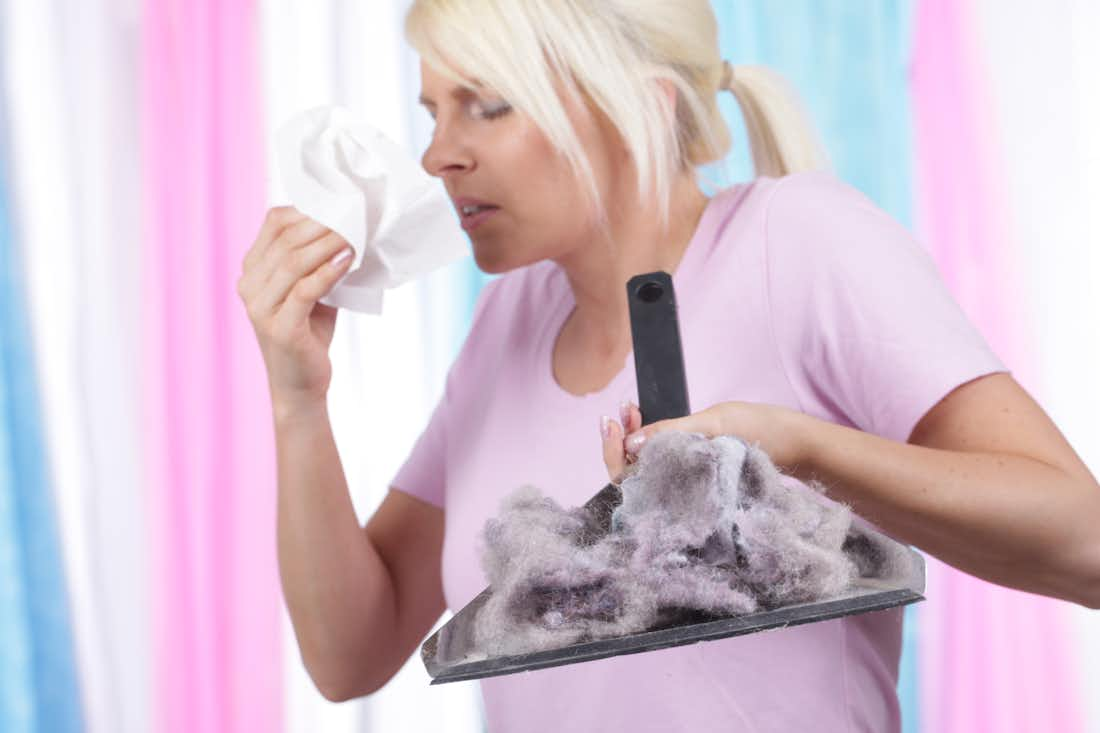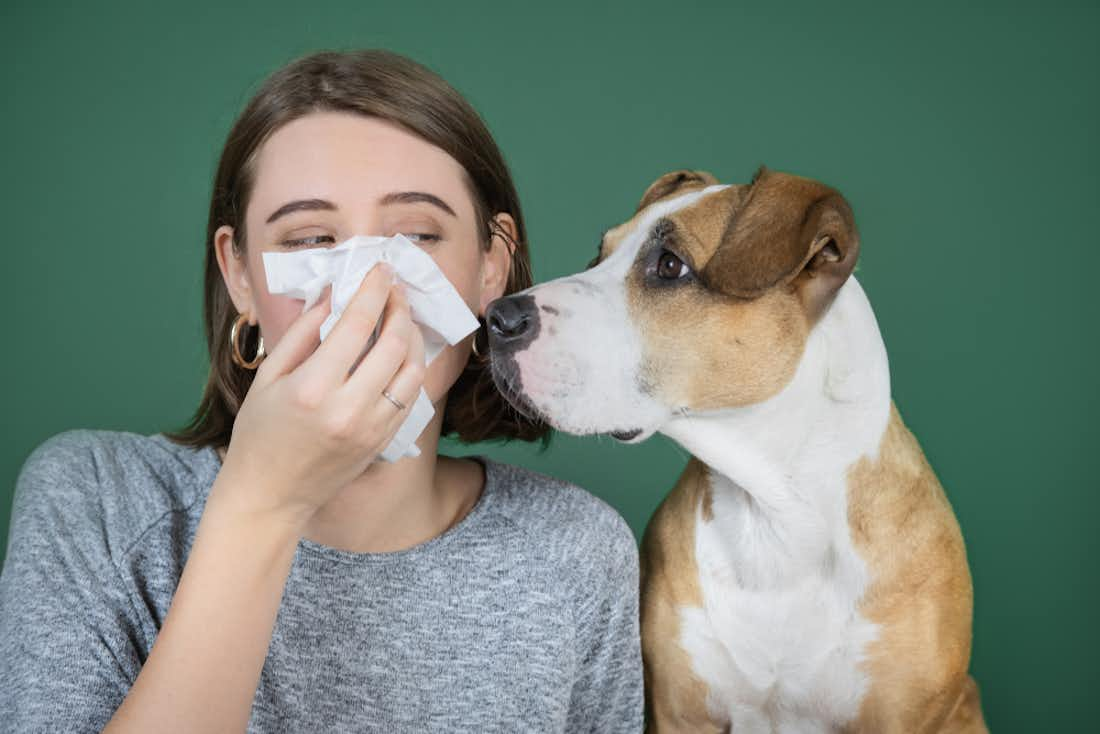Jul 14, 2022
9 Quick Tips for People With Allergy Induced Asthma
5 minute read
There are pretty much two things every human needs in order to sustain life. One is the ability to breathe oxygen. The other is a Netflix subscription. And even though one is more important than the other, we guess breathing is pretty important too.
Jokes aside, it’s no secret that breathing clean, fresh air is necessary for human life. But for some people with asthma, this life-sustaining task can become difficult and uncomfortable.
Asthma is a chronic condition that affects your lung’s airways. When you have asthma, these airways can become inflamed and narrow, making it difficult to breathe. Many people with asthma need inhalers that can help to expand the airways and make it easier to carry oxygen in and out.
For some people who experience allergic reactions, allergies and asthma often go hand in hand. Not only do people with asthma have a predisposition to certain allergy symptoms, but some allergies can lead to coughing, wheezing, and difficulty breathing.
In fact, allergy-induced asthma is the most common type of asthma in the US.
It’s time to end the discomfort. Here are some quick and easy ways to alleviate allergy-induced asthma.
1. Know Your Triggers
It’s pretty difficult to find relief from your allergies if you don’t even know what’s causing them. Pretty much any allergen can cause allergy-induced asthma, but some of the more common ones are airborne triggers like pollen, dust mites, pet dander, or ragweed.
If you notice that your symptoms worsen when you go outside, it might be seasonal allergies related to some form of pollen. But if you notice that they worsen inside, it might be dust mites or mold.
You can take the guesswork out of what’s causing your symptoms by taking an allergy test, which is one of the few exams you can pass without needing to study. Allergy tests measure the levels of immunoglobulin E (IgE) in your blood, antibodies that react to certain allergens.
You can take an allergy blood test right from the comfort of your own home with Cleared’s testing kit. It scans for 40 common indoor and outdoor allergens so you can know exactly what to watch out for to keep your lungs nice and cozy.
Symptoms To Look Out For
If you have had exposure to one of your triggers, here are some allergy-induced asthma symptoms to look out for:
- Feeling short of breath
- Coughing
- Wheezing
- Chest tightness
2. Try HEPA Filters
Since airborne triggers tend to be most inundating for the asthmatic individual, it’s important to try to keep the air around you as clean as possible. High-efficiency particulate air, or HEPA, filters are air purifiers that trap irritants so they can’t be released back into the air.
We recommend putting an air purifier into rooms where you spend the most time, like your bedroom or living room. This can help you feel more comfortable and reduce your symptoms throughout the day.
3. Keep Your Space Clean
Indoor allergen triggers love to stick to soft surfaces like your linens, bedsheets, and furniture. This is especially true if you’ve got pets that like to crawl around on your bed or couch.
You can easily make the air you’re breathing more comfortable by vacuuming carpets, rugs, or other fabrics in your home to reduce the pet dander and dust mites floating around your humble abode.
Additionally, we recommend cleaning your sheets at least once every week. And make sure you dry them in a drier rather than hanging them outside to avoid the risk of picking up pollen particles.
Some other things you'll want to consider cleaning pretty often include pillows, curtains, and your bathroom. Not only will your immune system thank you, but your sensitivity to allergens will too.
4. Do an Air Quality Check
Have you ever noticed your allergy-induced asthma becoming worse on certain days as opposed to others? You’re not going insane. The air quality outside can play a significant role in your symptoms, and it varies by day.
The air quality index measures the amount of air pollution in the atmosphere on a given day. The higher the number, the more uncomfortable it may be for vulnerable populations to go outside. You can check the air quality on a local news station’s weather forecast.
Plus, dry and windy days tend to see higher levels of pollen and mold spores in the air. These are days when it may be a good idea to stay indoors and catch up on some sleep, reading, or binge-watching.
5. Try Allergy Medications
From allergy shots to decongestants, you've probably heard of the many options to consider while you tackle your allergies.
If you need relief from your allergy symptoms fast, there’s really no better fix than antihistamine medications.
Histamines are chemicals found in the body’s cells, and they’re released when exposed to an allergen that the body perceives as harmless. These chemicals cause most allergy symptoms like sneezing, congestion, coughing, and wheezing.
Antihistamines, as their name implies, are medications that inhibit the production of histamines so that your symptoms become less severe. Most people take them in oral form.
With that said, if your symptoms are more localized to nasal congestion or itchy eyes, you can use a nasal spray or eye drop antihistamines, respectively.
But if you’ve ever looked at the price tag of these medications in your local drugstore, it was probably enough to spark an asthma attack on its own. The good news is that Cleared has generic versions of all your favorite brand-name antihistamines at just a fraction of the cost, so you can stock up without needing to sell your stocks. Asthma is mostly treated with inhalers. Consulting with your doctor on which inhalers are best for you is important.
6. Avoid Smoke
Among the many problems that smoking can cause for your health, asthmatic reactions are among the worst. If you’re a current smoker, you may want to consider taking a break to improve your lung health and prevent further problems.
With that said, even secondhand smoke can cause an asthmatic flare-up in vulnerable individuals. Try to keep your distance from people who are smoking around you. Don’t be afraid to politely ask individuals to move to another location to puff their cigarettes if it makes you feel uncomfortable.
7. Stay Hydrated
Drinking water is important for many reasons, but it might even be an easy solution to your allergy-induced asthma. Being well-hydrated helps keep your mucus thin, which aids in breathability and lets you break up blockages in your airways more easily.
8. Be Wary of Perfume
Allergen particles in the air are one of the leading causes of allergy-induced asthma. So when you fill the air with more pollution, it can naturally make you feel even worse.
For that reason, try to lessen your usage of aerosol sprays and perfumes, as these can cause significant breathing problems for those prone to asthma. If you need to use them, consider wearing a face-covering when using cleaning sprays or other misty aerosols.
9. Exercise Mindfully
For many people with asthma, exercising can make it difficult to breathe, and it might feel like it’s worsening your symptoms. However, it can provide many benefits as well. Daily exercise improves lung capacity, increases blood flow to the lungs, and promotes blood flow to the heart. This might help lessen your symptoms when exposed to allergens.
If you have exercise-induced asthma, you don’t need to let it hold you back from playing sports or engaging in activities you love. Try to ease into strenuous exercise with a warm-up period and limit your outdoor exercise when unhealthy air quality. Additionally, have your inhaler on hand in case you need to use it in a pinch.
Breathe Easy
Allergy-induced asthma is a common symptom for individuals with both allergies or asthma. It can make it difficult to breathe and lead to tightness in the chest and coughing. The good news is that there’s relief in sight!
You can easily diminish some of your symptoms by making sure the air you’re breathing is nice and clean. Do this with HEPA air purifiers or by staying indoors on days when air quality is poor. Additionally, drink a ton of water to loosen up mucus and try to stay away from smoke or other aerosol pollutants.
For fast relief of your allergies, antihistamine medications and inhalers can do the trick. But if you feel like you might need something more, your online allergist is ready to see you. Cleared is your one-stop shop to finally feel relief from the toughest allergy symptoms.
Sources:
Allergies and asthma: They often occur together | The Mayo Clinic
Immunoglobulin E (IgE) Defined | AAAAI
Definition: Histamine (for Parents) | Nemours Kidshealth
Health Effects of Smoking Cigarettes | Centers for Disease Control and Prevention
Authors

Dr. Payel Gupta
Medically reviewed by Dr. Payel Gupta



